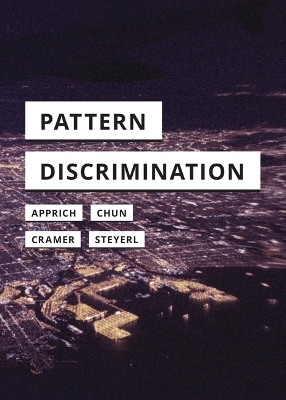
Pattern Discrimination
Seiten
2018
University of Minnesota Press (Verlag)
978-1-5179-0645-0 (ISBN)
University of Minnesota Press (Verlag)
978-1-5179-0645-0 (ISBN)
Bringing together media thinkers and artists from theUnited States and Germany, this volume asks the urgent questions: How can wediscriminate without being discriminatory? How can we filter information out ofdata without reinserting racist, sexist, and classist beliefs? How can we queerhomophilic tendencies within digital cultures?
How do “human” prejudices reemerge in algorithmic cultures allegedly devised to be blind to them?
How do “human” prejudices reemerge in algorithmic cultures allegedly devised to be blind to them? To answer this question, this book investigates a fundamental axiom in computer science: pattern discrimination. By imposing identity on input data, in order to filter—that is, to discriminate—signals from noise, patterns become a highly political issue. Algorithmic identity politics reinstate old forms of social segregation, such as class, race, and gender, through defaults and paradigmatic assumptions about the homophilic nature of connection.
Instead of providing a more “objective” basis of decision making, machine-learning algorithms deepen bias and further inscribe inequality into media. Yet pattern discrimination is an essential part of human—and nonhuman—cognition. Bringing together media thinkers and artists from the United States and Germany, this volume asks the urgent questions: How can we discriminate without being discriminatory? How can we filter information out of data without reinserting racist, sexist, and classist beliefs? How can we queer homophilic tendencies within digital cultures?
How do “human” prejudices reemerge in algorithmic cultures allegedly devised to be blind to them?
How do “human” prejudices reemerge in algorithmic cultures allegedly devised to be blind to them? To answer this question, this book investigates a fundamental axiom in computer science: pattern discrimination. By imposing identity on input data, in order to filter—that is, to discriminate—signals from noise, patterns become a highly political issue. Algorithmic identity politics reinstate old forms of social segregation, such as class, race, and gender, through defaults and paradigmatic assumptions about the homophilic nature of connection.
Instead of providing a more “objective” basis of decision making, machine-learning algorithms deepen bias and further inscribe inequality into media. Yet pattern discrimination is an essential part of human—and nonhuman—cognition. Bringing together media thinkers and artists from the United States and Germany, this volume asks the urgent questions: How can we discriminate without being discriminatory? How can we filter information out of data without reinserting racist, sexist, and classist beliefs? How can we queer homophilic tendencies within digital cultures?
Wendy Hui Kyong Chun is Canada 150 Research Chair in New Media, Simon Fraser University. She is the author of Update to Remain the Same: Habitual New Media. Hito Steyerl is professor of experimental film and video at the Berlin University of the Arts. She is the author of Duty Free Art: Art in the Age of Planetary Civil War. Florian Cramer is reader in 21st Century Visual Culture at Willem de Kooning Academy in Rotterdam, The Netherlands. Clemens Apprich is visiting professor at the Institute of Culture and Aesthetics of Digital Media, Leuphana University of Lueneburg. He is the author of Technotopia: A Media Genealogy of Net Cultures.
| Erscheinungsdatum | 19.09.2018 |
|---|---|
| Reihe/Serie | In Search of Media |
| Zusatzinfo | 3 b&w illustrations |
| Verlagsort | Minnesota |
| Sprache | englisch |
| Maße | 127 x 178 mm |
| Themenwelt | Sozialwissenschaften ► Kommunikation / Medien ► Allgemeines / Lexika |
| Sozialwissenschaften ► Kommunikation / Medien ► Medienwissenschaft | |
| ISBN-10 | 1-5179-0645-8 / 1517906458 |
| ISBN-13 | 978-1-5179-0645-0 / 9781517906450 |
| Zustand | Neuware |
| Haben Sie eine Frage zum Produkt? |
Mehr entdecken
aus dem Bereich
aus dem Bereich
Falzen, Heften, Binden für Gestalter
Buch | Hardcover (2023)
Verlag Hermann Schmidt
CHF 76,95
Das offizielle Adressbuch der Stadt Tübingen
Buch (2023)
Ungeheuer + Ulmer (Verlag)
CHF 39,95
Das offizielle Adressbuch der Stadt Freiberg
Buch (2023)
Ungeheuer + Ulmer (Verlag)
CHF 20,85


